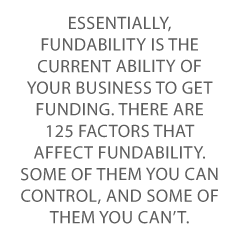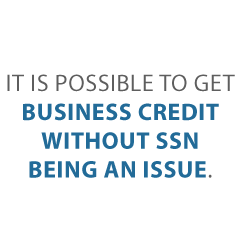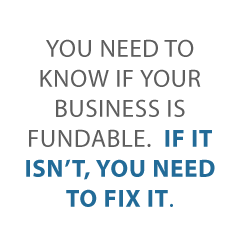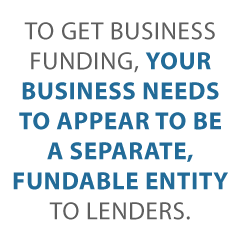Do you know about being fundable in a recession? Fundability – or, not just the ability to be funded but how desirable an entity is for funding – means different things to banks, venture capitalists, angel investors, and informal investors. However, they all agree on a few basic principles when answering the question of: is your business fundable in a recession?
Is Your Business Fundable in a Recession? The True Meaning of Fundability, and Just How Your Business Can Get Fundable
So, what does it mean when we speak about fundability? What does it mean when we say a company is fundable? This fundable analysis ought to get you thinking of your corporation – and corporate credit in a whole new light.
But first, let’s talk recessions.
Recession Era Financing
The number of United States financial institutions and thrifts has been decreasing progressively for a quarter of a century. This is coming from consolidation in the marketplace along with deregulation in the 1990s, lowering barriers to interstate banking. See: https://www.fundera.com/blog/happened-americas-small-businesses-financial-crisis-six-years-start-crisis-look-back-10-charts
Assets concentrated in ever‐larger financial institutions is problematic for local business owners. Big banks are much less likely to make small loans. Economic recessions imply financial institutions end up being extra cautious with financing. Thankfully, fundability does not depend on financial institutions alone.
Is Your Business Fundable in a Recession? What Does it Mean?
Let’s get that fundable meaning out of the way from the very start.
Fundable: of or capable of being funded; deserving of being funded.
Yet what is the fundable meaning in our context?
Is Your Business Fundable in a Recession? The Business Credit Context
Here, the meaning is just a little bit different.
While it’s still capable of being funded, it also indicates – able to be funded by a loan provider or a credit company.
With this fundable definition, we are looking more at what credit issuers and loan providers wish to see. But let’s go back for a moment.
Is Your Business Fundable in a Recession? Why Does It Matter?
You’re a business owner. And like every single other entrepreneur, since the beginning of time, your company needs cash.
There are a few means for companies to get cash. Without entering into the nitty gritty information, the main ways for companies to get money are to:
(1) Sell products or services
(2) Sell their assets such as land, vehicles, tools, or office space in buildings they have
(3) Acquire crowdfunding
(4) Get angel investing or venture capital payments, or
(5) Borrow cash.
For the purposes of our fundable investigation, we are just looking at # 5.
Loan providers and credit providers want to see if your company is a good credit risk. To firms which are fronting your corporation cash, they want to know that you can pay them back.
Fraud Runs Rampant
Complicating matters is the problem of scams. Per a 2009 Experian report, “fraud-related costs for U. S. businesses are more than $50 billion annually. This figure may understate the extent of the problem, as estimates show that up to 30 percent of all bad-debt commercial losses are due to ‘soft’ fraud, which primarily occurs from material misrepresentation on an application. Combined with the fact that business fraud is estimated to be three to 10 times more profitable than consumer fraud, business fraud has become a growing concern for organizations.”
As a result of so much fraud, lenders and credit providers inspect credit applications very thoroughly.
Essentially, they are trying to find all kinds of ways to tell you and your firm no when you come to them for cash. Their fundable meaning includes the component of fitting their requirements for not being scammers. For financial institutions and the like, business legitimacy makes all the difference in the world. No legitimacy, then no funds. It’s that simple.
As a result of their careful checks for fraud, lenders and credit providers are taking into consideration numerous different aspects of your credit or loan application. They are looking at many aspects of your company, as well, and even at facets of you, the owner’s existence.
Your mission is to ease their fears of frauds. And the way in which you do this is by eliminating every factor they can point to, to potentially say no to offering you money.
A Substantial Side Benefit to All This Fundability
There’s another reason fundability matters. Your leads and customers likewise want to feel that your corporation is the real deal. They don’t want to do business with what they view to be a fly by night operation. And could you blame them?
Developing and improving fundability to lenders and credit providers will have the added reward of giving off a reliability vibe to individuals and corporations aiming to buy your goods or services.
Is Your Business Fundable in a Recession? Data Details
Fundability starts with recognizing what lenders and credit issuers are looking for. Then we’ll have a look at exactly how to most effectively accomplish and supply what they want.
Fundability all begins with your industry.
Your Industry Can Make or Break If Your Business is Fundable in a Recession
Some industries are thought to be high risk or restricted. These industries, by definition, are most likely to have a harder time getting funding of any type. How fundable is your business should start with – how fundable is your industry?
Industry Selection High Risk or Restricted
Usually, restricted and high risk industries have some things in common. There may be high risks of injury at work. Or the industry might engage in a great deal of cash transactions. This is true regardless of the safety record of a particular firm, or the majority of its transaction types.
Consider Some High Risk Industries
Per the SIC, the following industries are high risk: travel agencies. The NAICS concurs.
A Look at Some Restricted Industries
Per the SIC, the following are restricted industries: pawn shops. The NAICS agrees.
Industry Aligned on All Records
This is the idea of congruency, and it is going to show up again and again. Business credit reporting bureaus and lenders will examine your firm diligently. Among the major ways they do this is by strictly checking for matching records.
Due to this, if your records do not all match, it will show up as if they are missing. Missing records will trigger a rejection, as a loan provider will assume fraud on its face.
As a result, it is crucial to make sure that every record, everything, is identical.
It goes beyond your industry. It’s also your corporate name, address, phone and fax numbers –everything! These must look the same all over, such as in IRS records; your company’s records with Dun & Bradstreet, Experian, and Equifax; all licenses needed to run your corporation; and incorporation documents.
Copy/paste this information; do not chance it with retyping.
Business Name
You can be innovative when naming your business.
Beyond crafting the perfect unforgettable name which is easy to spell and say, and also evokes your corporation’s mission statement, there’s also the matter of risk. Including a risky business type in your company name will trigger funding denials.
There is nothing misleading, illegal, or underhanded in keeping the name of a high risk or restricted industry out of your business name.
Listed ownership uniform
Congruency counts here, too. Your listed company ownership must be the same anywhere you provide it.
All corresponding pages list uniform business data
It is best practices to maintain a record of every place where your business has a listing.
A Professional Website Can Make a Difference When it Comes to Being Fundable in a Recession
A professional web site is a must. A business needs a professional-looking internet site. And it must have website hosting from a provider like GoDaddy. Don’t use Weebly or Wix. It needs to be your domain, not domain.wix.com. Use Upwork to employ people who can help you get set up. Get a professional logo from Fiverr.
Industry aligned
Consider the more successful competition you have in your market. What do they include? What do they leave out? And what do they highlight?
You do not need to copy another website, and it isn’t in your best interests to do so, anyway. But do not hesitate to crib from some of their better ideas. If those concepts benefit them, then they might help you, as well.
Business owners listed
Just like on the documents of the business, you need to display the owners of your business.
Customers and potential customers want to know who they’re dealing with.
And do not forget to include your About Us web page on your checklist of locations with company details which must be consistent.
Business name and address uniform
Congruency is a requirement here too.
Special characters
It’s the exclamation point in Yahoo! or the like. Don’t do this, if you can at all help it.
There are going to be people inputting your business name right into internet browser address bars. By adding special characters, you’ve just made it harder for them to do that.
Industry in name
Is it better to place the name of your industry into your company name, or not?
If your industry isn’t high risk or restricted, then it may be a good idea. Making things clearer for your potential customers and clients is usually beneficial.
But don’t place the name of a high risk or restricted industry in your business name! There is absolutely nothing deceptive or misleading about this.
Available with state
Is your corporate name available in your state? Check your name with your Secretary of State. They could require that a business name be unique.
Searchable
Any web site must be searchable.
Because if you make your customers and prospects go to another web site, they may not return.
A Business Address Can Help Decide If a Business is Fundable in a Recession
A corporate address must be an actual brick and mortar building. It must be a deliverable physical address. This can never be a home address or a PO Box. Do not use UPS mailing addresses. Some lenders will not approve and fund unless this criterion is met.
PO Box PBSA
A PO Box PBSA stands for a PO Box Post Box Street Address. Lenders and credit providers understand that these are really post office boxes. They will see these as being non-legitimate ‘addresses’, just like post office boxes.
Physical or virtual office (CMRA)
Many entrepreneurs, particularly startup owners, don’t have the cash for actual office space. But loan providers check USPS and places like Google Maps to see if you’re using a home address. If you are, you often get an immediate decline. Never use a home address on your application. Even if your business is only you.
Luckily, the good news is, virtual offices are available in all states and many cities.
A virtual address is a fantastic solution. We recommend Alliance Virtual Offices, Regus, and DaVinci.
Same state business is incorporated
Your virtual office, preferably, must be in the same state where your company is incorporated.
Mailing address vs. physical address
In the exact same vein as the caution against a PBSA, you need a real physical address versus a mailing address.
A Business Phone Number Helps Determine If a Business is Fundable in a Recession
Your corporation must have its own phone number. Do not give a personal cell or residential phone as a business telephone number. But VOIP (voice over internet protocol) is fine.
Also, your company telephone number must be toll-free. This is 800 exchange or such.
Uniform number
Again, congruency is an absolute requirement. This includes using the area code anywhere the number is provided.
Mobile, Home, and Business numbers
A cell number or home telephone number as your primary business line could get you flagged as un-established. Your company number must only be used for your corporation. It must not be an additional line for your family to use.
Voicemail content
Your voicemail greeting should, at an absolute minimum, inform the customer who they have reached and when you can return their phone call.
Business 411 Listing
You must list your corporate telephone number on 411. You can do so on ListYourself.net.
Your phone number needs to have a 411 listing for most credit issuers, lenders, vendors, and even insurance companies to approve you. Check your record to see if you’re listed. Make sure your info is accurate.
Business name and phone number uniform
As always, congruency is crucial here.

Demolish your funding problems with 27 killer ways to get cash for your business. Get money even during the worst of a recession.
Time in Business Can Help Make a Company Fundable in a Recession
The amount of time you have been in business is, of course, an indicator of reliability and as a result fundability to lenders and credit issuers.
Incorporation date
But what is the day when a corporation starts? It’s the day of incorporation. This is one reason why, the quicker you incorporate, the better.
Business license issue date
Does your company have every one of its necessary licenses to operate in your industry and area? When did you get your licenses? A lender or credit provider will not consider your business to genuinely be in business if you’re missing critical licenses. The faster you get licensing, the better.
With no license to work in your industry, your ability to attain fundability is cut off at the knees. The lender or credit provider will feel it’s more important to protect the public than to offer you money.
A Business Bank Account Helps Decide If a Business is Fundable in a Recession
An essential piece of the fundability puzzle is having a separate business bank account. You need a business bank account, to keep funds separate from your personal accounts. Commingling personal and company funds and expenses is a recipe for an audit from the IRS. The simplest way to keep these two universes distinct is to have separate bank accounts.
Bank account open date
The date you open your business bank account is a crucial one in the life of your corporation. The account opening date is the business’s opening date, far as lenders are concerned. A longer history is better.
It’s also the business’s opening day, so far as the business CRAs see it. This is because the business CRAs have seen some firms attempt to do an end-run around time in business requirements by buying shelf corporations.
A shelf corporation is a corporation with value just in its age and nothing else. CRAs see the practice of buying them as deceptive. As a result, entrepreneurs can end up spending hundreds if not thousands of dollars for a shelf corporation, only to see their money squandered when the age of the shelf corporation isn’t considered by the CRAs at all.
Actual business account (not personal)
There are some similarities between personal and business bank accounts. But to open a business bank account, the business owner must submit added documentation. This includes business registration paperwork. It can often (though not always) include proof of having an EIN.
A business bank account lists both the owner and the business. Such accounts may require a certain minimum balance to avoid maintenance fees. Fees in general tend to be higher than those for personal business bank accounts.
Business name, address, and ownership uniform
Congruency is a requirement here, as it is in all other areas.
Checking account history
Financial institutions keep credit scores which help them find out whether to loan your company money. Essentially, these are objective measures of fundability, per the lender. In part, these ratings are based upon the historical actions of you with reference to your company bank account.
A score of Low-5 is usually believed to be the minimum rating for getting financing.
Potentially the easiest way to accomplish and maintain a fantastic bank credit score is to deposit a minimum of $10,000 into your business bank account and maintain it there for as long as three months. In addition to that, make consistent deposits.
These actions will help in three ways. One, you will have kept a superb minimum balance for a minimum of three months. Two, you will most likely not overdraw with such an outstanding balance. And three, you will be at the magic minimum for a Low-5 bank credit rating.
NSFs and Negative Balances
Writing checks with insufficient funds (NSFs), or going into the red are surefire ways to spoil your bank rating.
By maintaining a minimum balance of $10,000 on a consistent basis, you will, generally, make NSFs and negative balances a distant memory.
Business Entity
A business entity defines issues of liability, and it makes a difference when it comes to taxes.
The best business entity for fundability is a corporation.
Corporations are legally distinct from their owners. This holds true even when a business has just one employee or only one owner. Or they are the same person. Whether you pick a C-corporation, an S-corporation, or an LLC is your choice. Speak with a lawyer or an experienced tax specialist to determine which is the best possible choice for you.
Sole proprietorship
A sole proprietorship means the business owner is it when it pertains to liability and tax obligations. No one else is responsible.
DBA
Any full company name must include any recorded DBA filing you use. This is a requirement for records congruency.
But no matter what, if you run a small business as a sole proprietor, the best thing to do is to incorporate. If you have already filed a DBA, you will still have to move onto a corporate business entity. You ought to only consider a DBA as an interim step on the way to incorporation.
Good standing
Check with your Secretary of State to ensure they have all the required info for your company. See to it that you are in good standing with them, and that your entity is active. You must file annual reports and pay a fee every year to remain active.
Foreign filing
A foreign LLC is a limited liability corporation formed in one state but registered in another state. It isn’t an LLC formed outside of the USA. A distinct registration is required because the laws between the states vary.
If your business operates outside of your state, it will strengthen fundability to foreign file.
Registered agent
A corporation will also need to pick a registered agent that they show on the Articles of Incorporation. A registered agent receives service of process and legal and tax papers on behalf of the corporation.
Business name, address, owners, and listed ownership uniform
Congruency is necessary here, as in all other areas. This includes if you were in business prior to incorporating, as generally states will require a firm to use a term like ‘incorporated’ or ‘LLC’ in its name.
Date acquired
If you purchased your company from another person, when was that? It will count towards time in business. The longer, the more fundable your company is.
EIN #
Visit the IRS website and get a free EIN for your business. This is also where you pick a business entity like corporation, LLC, and so on
To open a business bank account, you need an EIN, so get this out of the way first. The IRS has a form for everything, including getting an EIN, the Federal tax ID number. This is form SS-4. When you have filled it out, either mail or fax it to the appropriate office. The form includes this info.
EIN issue date
You must get your EIN ASAP, so you have it for filing tax returns and making bank deposits. Per the IRS, if you do not have an EIN by the time your corporate tax return is due, write ‘Applied For’ and the application date in the space where you’re supposed to add the EIN. Do not put your Social Security Number there.
Being behind in filing your taxes will not do your company any favors regarding fundability.
Business name, address, owners, industry, contact information, and listed ownership uniform
Congruency is a requirement on your EIN application, as in all other areas.
Email
Corporate e-mail addresses must be professional. This means something like admin@yoursite or info@yoursite.
Company domain
Your corporate e-mail must be on the exact same domain as your company. Do not use generic free e-mail services likes Gmail, yahoo, or msn.
Uniform on all records
As anywhere else, congruency is a necessity for email records.

Demolish your funding problems with 27 killer ways to get cash for your business. Get money even during the worst of a recession.
Business Licenses
A corporation must have all of the licenses essential for running.
These licenses all must be in the perfect, accurate name of the business. And they must have the same corporate address and telephone numbers.
This means not just state licenses, but potentially also city licenses. Check with your Secretary of State’s office.
Business name and listed owners uniform
Congruency is a requirement on your business licenses, as in all other areas.
License obtained when required (not always required)
Your state and industry can have their own licensing requirements, if any. The best place to find the specifics is with the Secretary of State’s office for the state where your business is incorporated. If you do business in more than one state, then check their Secretary of State offices as well.
Business Credit Reports
Fundability commonly depends on corporate credit.
Bureaus
The most significant and best-known business credit reporting agencies (also called CRAs or bureaus) are D&B, Experian, and Equifax.
D&B report
This is the only bureau for credit monitoring strictly concentrated on company credit. It looks into your company’s interactions with suppliers and vendors. Many potential suppliers check the Dun & Bradstreet report on your company prior to offering credit terms. This means it is critical for you to keep the D&B report of your company updated and accurate.
Experian report
Like Dun & Bradstreet and Equifax, Experian also gathers details available in various public records together with info from collection agencies, credit card companies and various other data sources.
Equifax report
This bureau likewise gathers all trade credit information and information from various public records to examine your company’s creditworthiness. However, their report depends heavily on how your corporation interacts with various banks as well as different traditional lenders like credit card providers.
Business Data Agencies
These businesses collect data and supply it to the business CRAs.
CreditSafe Helps Determine If Your Business is Fundable in a Recession
CreditSafe offers business and consumer reports. They also offer monitoring, collection services, and financial statements.
CreditSafe also provides alternative credit, where they base some of their scoring on utility and rent payments. These payments are typically not considered by other CRAs unless they’re late. CreditSafe reports these payments whether positive or negative.
Utility payments on your CreditSafe report can include power, cable, internet, and phone. Other third-party payments like Credit Suite, CRM, and software can be included.
LexisNexis Report
LexisNexis is a source where a number of the lenders denying funding applications get their information from. They provide info regarding likelihood to pay, or not.
Lenders compare LexisNexis information to what you put on your loan application. If the application and LexisNexis do not match, then loan providers will deny you a loan. They will see the variance as fraud.
SBFE
The SBFE gathers data on small businesses from its members, which are lending institutions. Lenders use this info to make credit decisions.
FICO SBSS
FICO uses its SBSS (Small Business Scoring Service) Score to combine consumer bureau, monetary, application, and business bureau information. FICO then validates their SBSS models for deals like Line of credit transactions, term loans, and commercial card obligations up to $1 million. The idea is to assess just how your small business pays off all sorts of loans.
Business credit providers and the SBA use the FICO SBSS score as a tool to decide whether they ought to authorize a loan to your company.
Identification Numbers
The CRAs use identification numbers to designate your corporation.
BIN # (Business Identification Number)
Experian’s BizSource assigns a BIN.
D-U-N-S #
Begin at the D&B website and get a free D-U-N-S number. If there is no D-U-N-S number, then there is no record and no PAYDEX score. Your D-U-N-S + 3 payment experiences gets you a PAYDEX score.
Business Credit History is Vital for Being Fundable in a Recession
Your business credit history is the single most important driver of your business credit scores. In turn, this influences fundability profoundly.
Late repayments will impact your business credit score for years. If you pay your corporate financial obligations off, as rapidly as possible and as completely as possible, you can make a very real difference in your credit scores. No other aspect of business management more directly impacts your business credit scores.
Make certain to pay on schedule and you will directly and positively impact fundability.
UCC Filings
If the business owner has poor personal credit, lenders will typically secure a UCC blanket lien if they give your business a loan.
A UCC blanket lien is a note which goes on your credit report. It states that the creditor has an interest in all your business’s assets till you pay off the loan in full. Hence, there may be dire consequences if you default.
These UCC filings are a matter of public record. Lenders and credit providers take them into consideration when determining if your business is fundable.
Judgments, Liens, and Bankruptcies
These are all a matter of public record, and they can all negatively impact fundability.
In addition to UCC blanket liens are any other kinds of liens as against your business assets. A lien is a credit provider’s right to retain possession of property belonging to till the debt owned by that person or company is discharged.
A lien isn’t quite the same thing as collateral. Rather, it’s the property which is subject to the lien is the collateral.
Total number of trade accounts and highest credit limit
These come from credit issuers which give you starter credit when you have none. Terms are frequently Net 30, versus revolving.
The more trade accounts, the better. In general, at least five to eight are necessary before moving onto credit cards which are harder to get. But pay attention to your highest credit limit.
Your highest credit limit is an important figure for credit issuers and lenders. For example, unsecured financing can result in a loan of 5 – 8 times the amount of your highest revolving credit limit account. So, by definition, the higher your highest credit limit, the more you can get from this form of financing.
In addition, some credit issuers want to see a particular high credit limit before they issue credit to your business. In general, a few high credit limit accounts do more to enhance business fundability than a large number of very low credit limit accounts.
Age of trade accounts
How long have your trade accounts been open? This should correlate more or less directly with your time in business. By getting trade credit ASAP, your trade accounts are as aged as they can be.
Don’t buy business tradelines, to artificially inflate the age of your trade account. The FBI has found that the trade line company can be a fake and the primary card holder can be a stolen identity in these kinds of scams. Business CRAs are well aware of these scams. If you or your business are caught, you will be blacklisted by CRAs like D&B and your fundability will likely never recover.
Financial data
Lenders and credit providers want to see your business’s financial data. Without this info, they will wonder if they can trust your statements about your business’s financial solvency. Increase fundability by providing this information when requested.
Open accounts
Opening and responsibly using company credit accounts can help you boost your available credit and enhance your credit rating. The key is to use your credit. Simply opening a lot of accounts and never using them is not going to do anywhere near as much to improve fundability.
Closed accounts
Closing accounts has a direct effect on overall credit history. If a card is closed and is in good standing, it will fall off a credit report eventually. And as soon as it’s gone, the history which went along with it is gone, too. A card in good standing can be closed by the card owner or by the credit provider if the card owner hasn’t been using the credit. This is different from a card closed in poor standing, where that information stays on your credit report for longer.
By closing accounts, you are tanking the average age of your accounts. It’s a part of fundability over which you have control. Simply use your credit and pay it back without delay. This way, your providers will not feel the need to close accounts for non-use.
Business Information to Make Your Business More Fundable in a Recession
The most crucial issue with your company info is to be absolutely certain it is consistent from document to document.
Business name and address, listed ownership, and contact information uniform
Congruency is a requirement in your company CRA records, as in all other areas.
Financial Statements
Many credit providers and lenders not surprisingly want to see your company’s financial statements.
Business Financials
Corporate financials include if your business is making a profit, as well as your financial estimates for the coming quarters.
Business tax returns
Some alternative lenders now offer credit lines for $50 – 150,000. They will typically only want tax returns versus all income documentation. For over $100,000, you must provide a P&L and a balance sheet.
The approval amount is commonly 10% of yearly sales per company tax returns.
Business financial statements (company/accountant prepared or audited)
Standard corporate financial statements include your income statement, a statement of retained earnings (AKA the statement of owners’ equity), company balance sheet, and a statement of cash flows.
It will considerably and favorably affect your fundability if you have them prepared or at least audited by an accountant or an accounting firm.
# of years tax returns filed
How long has your business been operating? And how many years has it been filing tax returns? Those numbers must be the same, even for years your company loses money.
Reported income and expenses
What is your company’s reported income? Do your reported expenses surpass your reported income? Are they commensurate with those anticipated from a business of your size, age, and industry?
Taxes up to date
Are your corporation’s taxes up to date? If payments to the IRS are slow and late, then lenders and credit providers will think your payments to them will follow the very same pattern.

Demolish your funding problems with 27 killer ways to get cash for your business. Get money even during the worst of a recession.
Personal Financials Can Decide If a Business is Fundable in a Recession
In particular for newer corporations, credit issuers and lenders will want to see your personal financials.
Personal financial statements
Can your personal financials be located? Do they show responsible financial stewardship?
Personal tax returns and how many tax returns can be offered
Are your personal tax returns in order? Can you put your hands on all or a minimum of the majority of your tax returns and supply them if requested? Do you file on time? If you need to pay, do you pay on time? If the answer to any one of these questions is no, then fundability is damaged.
Reported income and expenses
Are they proportionate with the kind of income and expenses anticipated from the owner of a corporation of your size, age, and industry?
Debt to income
This ratio is all of your monthly debt payments, divided by gross monthly income. This number is how lenders and credit providers measure your ability to pay back whatever you borrow. It is a vital part of the answer to their question – is your business fundable in a recession?
Child support and Criminal record Both Affect If a Business is Fundable in a Recession
Both affect fundability. Are you up to date on child support payments if you do not live with one or more of your minor children? Do you have a criminal record?
Bureaus and How They Help Determine If Your Business is Fundable in a Recession
Just like there are business credit reporting agencies, there are CRAs for personal credit.
Experian and Equifax
In addition to reporting on business credit, Experian and Equifax also report on personal credit.
TransUnion
TransUnion only reports on personal credit. A TransUnion credit report can include your personal mortgage account, even if you completely paid your mortgage off. Your TransUnion report will also show any public records about you, such as judgments against you.
Data Agencies and How They Determine If Your Business is Fundable in a Recession
There are companies which collect data and provide it to the personal credit reporting agencies.
ChexSystems
Some banks and other credit issuers use ChexSystems to get more information on your personal credit habits. They also report on insufficient funds, closed accounts, and overdrafts.
LexisNexis
Lenders use LexisNexis information to cross-check loan applications. They want to see if their loan criteria are being met. They want to determine if what you claim on your application jibes with the records. And they want to know if it’s likely your business will fail.
FICO
Your FICO score comes from your payment history, amounts of owed, length of credit history, credit mix, and new credit. Together, the first three elements comprise over 3/4 of your FICO score. Responsible financial management, over time, will enhance fundability the most effectively.
Personal Credit History
Much like your business credit history matters for calculating fundability, so does personal credit history.
Accounts over limit
If the number of accounts over limit is more than zero, it can tank your fundability.
Authorized users
Are the authorized users on your accounts strangers you’re getting to pay you to piggyback on your credit? This is just barely this side of legal and often a prelude to fraud. Most credit issuers and lenders will see it as proof of intent to commit bank fraud.
Short sales
In a short sale, you try to sell your home for less than you owe. But this can only happen if the lender agrees. If the house sells, lender keeps the proceeds. Not all lenders agree to a short sale. Often, homeowners must be 90 or more days late for a lender to so much as consider the idea.
Some lenders may not forgive the unpaid balance on the mortgage. Some state laws let lenders seek deficiency judgments forcing you to repay the difference between the sale price and the balance due on the mortgage.
Lenders report a short sale to TransUnion, Experian, and Equifax as a charge off, settlement, deed-in-lieu of foreclosure, or loan settled for less than the amount due. How a lender reports the short sale can significantly impact the damage to your credit score.
Any late mortgage payments made before sale will further undermine your score. If lender gets a deficiency judgment to collect the mortgage balance, that also will damage your score, as will the amount of the deficiency.
A short sale will drop a personal credit score by up to 100-150 points. The higher your credit score to start, the more it will plummet.
Short sales can stay on your credit report for as long as seven years. But it isn’t as bad as a foreclosure or a bankruptcy.
Settled debt
Settled debt is a plus for fundability. It’s a huge part of the answer to the question of whether your business is fundable in a recession.
Foreclosures and late payments
Just like a bankruptcy, foreclosures negatively impact your fundability. And the larger and later your late payments are, and the more of them there are, the more they harm fundability.
Opened accounts
With fewer than five, your file may be seen as “thin” and it will negatively impact your fundability.
Financing facilities reported and history length
In general, major retailers and banks on a report correlate with a longer and more favorable personal credit history. But a shorter credit history is generally not seen as favorably as a longer one.
Inquiries
More than two recent inquiries will be seen as proof of credit shopping.
Utilization per credit card/line
Credit Utilization Rate is credit in use, divided by total available credit. Keep this ratio at about 30% or less. Experian checks utilization rate both overall and per credit card.
Bankruptcy
This is a court proceeding where a judge and a court trustee check your assets and liabilities. Personal bankruptcy tends to be conflated with a lack of personal financial responsibility.
Will an explanation to a credit provider or lender help with fundability? It’s worth the effort.
Application Process
Even the process of applying can have an impact on your fundability.
Application Submission
How are you submitting your application? What does your lender or credit provider prefer?
Timing
Your most recent three months’ worth of bank account management loom large. This is due to a number which banks keep but don’t publicize, the bank rating.
A bank rating measures the average minimum balance as kept in a business bank account over a three-month period. Therefore a $10,000 balance ranks as a Low-5, a $5,000 balance rates as a Mid-4, etc.
A small business’s chief goal ought to always be to keep a minimum Low-5 bank score (or, an average $10,000 balance) for at least three months. Without a minimum of a Low-5 score, most banks assume the business has little to no ability to pay off a loan or a business line of credit.
Lender negotiations and online, paper or in personal application
In particular, an application presented in person allows for a dialogue and negotiations. This is seen as the most serious and generally the most fundable. In person, a lender can directly assess the answer to their inquiry: how fundable is your business?
Lending product selected
Are you trying for a very large loan the first time around? You probably won’t get it. By proving your financial responsibility, lenders will be more likely to loan to you, and to loan you more.
Lender
Many lending institutions prefer working with certain industries. If the bank is more comfortable with your industry, then it will help your fundability cause.
Business ownership, name, and address verifiable
Ownership documents will prove your business ownership, name, and address and bolster your fundability.
Is Your Business Fundable in a Recession? On Balance
Keep all records consistent to your business can be fundable in a recession. Set up your business legitimately, with a domain, phone numbers, an address, and more. Get all ID numbers and register with the IRS. Set up your business bank account for fundability. Keep all business financials organized and have them prepared by a competent professional. Get your personal credit ‘house’ in order.
Being fundable means your business can get financing from a credit provider or lender. So, is your business fundable in a recession?
The post Being Fundable in a Recession appeared first on Credit Suite.













